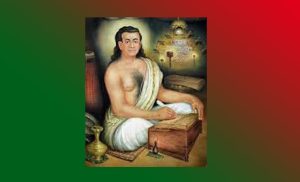Sri Sankardev | Life of a Great Man
Sri Sankardev
Introduction
Sri Sankardev, also known as Srimanta Sankardeva, was a remarkable figure deeply immersed in spirituality and culture. He established the Neo-Vaishnavite faith and made significant contributions to Assamese culture. Born in 1449 in what is now Assam, India, his life was marked by a profound spiritual quest, artistic brilliance, and a strong commitment to fostering social and religious change.
Birth and Parentage
Sri Sankardev was born in the serene village of Alipukhuri in the North Kamrup region of Assam. His parents, Kusumvar Bhuyan and Satyasandhya, were devout Hindus. His father was a respected Brahmin scholar, and his mother was known for her piety and wisdom. Sankardev’s family background played a pivotal role in shaping his spiritual and intellectual journey. He grew up in a nurturing and religious environment, laying the foundation for his future contributions.
Education
Sankardev received his early education under the guidance of his father and other learned scholars of his time. He displayed exceptional intellect and a natural inclination toward religious and philosophical matters. At a young age, he mastered the Vedas and classical scriptures, demonstrating a profound understanding of Hindu philosophy and religious texts. However, his education extended beyond traditional religious teachings. Sankardev was also well-versed in various art forms, including music, dance, and drama. This comprehensive education later became the cornerstone of his efforts to promote a harmonious blend of spirituality and culture.
Pilgrimage and Preaching
Sankardev’s life took a transformative turn when he embarked on a pilgrimage to Puri in Odisha. During this pilgrimage, he had a series of profound spiritual experiences that inspired him to embark on a mission of religious and social reform. He recognized the need to rekindle and reinterpret Vaishnavism, a sect of Hinduism, with an emphasis on devotion to Lord Krishna. His teachings stressed the importance of devotion, simplicity, and a personal connection with God, which resonated with the masses.
Upon returning to Assam, Sankardev commenced his mission by composing devotional songs and creating a new form of devotional drama known as “Ankia Naat.” These cultural expressions became powerful tools for conveying spiritual messages to people in an accessible and engaging manner. He also established monastic orders called “satras” to spread his teachings and serve as centers of learning and cultural preservation.
Contribution to Assamese Culture
Sankardev’s contributions to Assamese culture are immeasurable. He enriched Assamese literature with his devotional and philosophical works. His songs and poetry, collectively known as “Borgeets,” continue to be an integral part of Assamese cultural and religious heritage. The “Ankia Naat” plays, frequently performed during religious festivals, combine music, dance, and storytelling, and they remain a cherished form of traditional Assamese theater.
Sankardev’s impact extended beyond the religious and cultural spheres. He worked diligently to bridge various societal divides, advocating for social harmony and inclusiveness. His teachings transcended caste and creed, promoting unity and devotion as the ultimate paths to salvation.
Conclusion
Sri Sankardev’s life and teachings remain a source of inspiration and guidance for millions of people, not only in Assam but also across the Indian subcontinent. He laid the groundwork for the Neo-Vaishnavite religion, emphasizing devotion, cultural richness, and social cohesion. His legacy endures through the countless cultural and religious expressions he nurtured and the profound impact he had on Assamese society. Sri Sankardev‘s life is a testament to the transformative power of spirituality, art, and social reform, making him a revered figure in the history of Assam and India as a whole. 0 0 0.
Life of a Great Man
You May Like:
Additional Searches:







